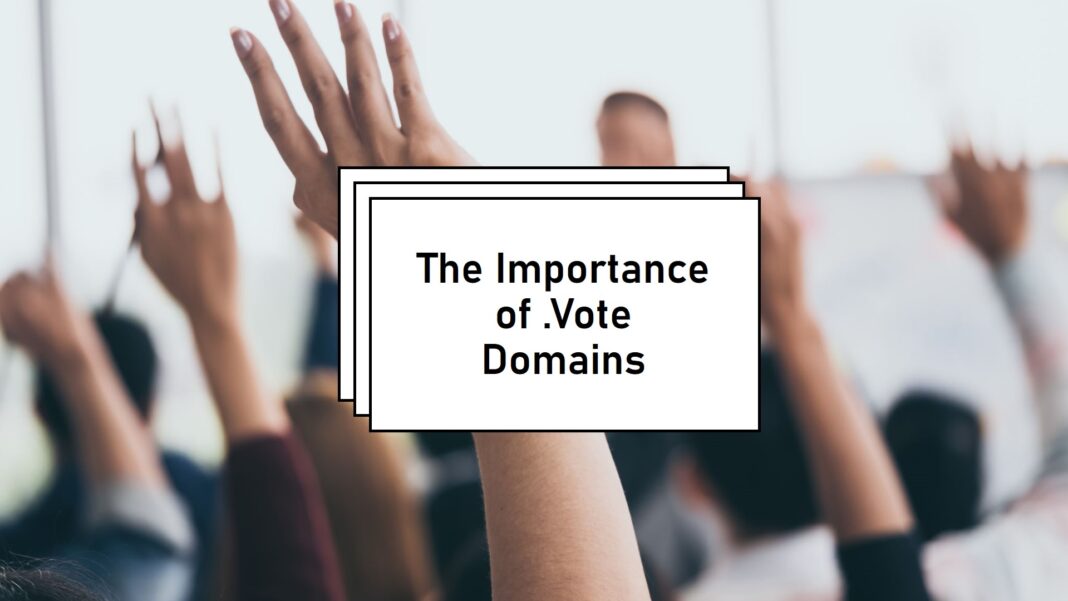In the rapidly evolving world of digital campaigning, the need for a strong online presence has never been more urgent. With voters increasingly turning to the internet to gather information, interact with candidates, and engage with political campaigns, the domain name you choose for your website can have a significant impact on your visibility, trustworthiness, and effectiveness.
The .vote domain extension, specifically designed for political campaigns, voter advocacy, and election-related activities, is a smart and strategic choice for anyone looking to establish a credible online presence. This article will provide a step-by-step guide on how to secure your very own .vote domain for your political campaign and why it’s a crucial part of your digital strategy.
Why You Should Secure a .Vote Domain for Your Political Campaign
Before diving into the steps of securing your .vote domain, let’s first look at why this domain extension is such an important tool for political campaigns.
1. Enhances Trust and Credibility
The .vote extension signals to your audience that your website is focused on the democratic process, creating an automatic association with credibility. Whether you are a candidate, political party, or advocacy group, voters will feel more confident visiting a site with a .vote domain because it aligns with the essence of their civic duty—voting.
2. Increases Visibility and Relevance
Search engines favor domains that closely match the user’s query. By incorporating the keyword “vote” into your domain, you improve your chances of ranking for election-related searches. This makes it easier for your target audience to find your website and learn more about your campaign.
3. Strong Branding and Messaging
A .vote domain is a powerful branding tool. It immediately communicates your focus on the voting process and can help build a sense of urgency among voters. Whether your website is aimed at educating voters, encouraging registration, or promoting your candidate’s platform, the .vote extension offers a unique opportunity to reinforce your message.
4. A Secure, Dedicated Space for Election Activities
As we’ve seen in recent years, cybersecurity and data privacy have become major concerns in the political arena. A .vote domain is specifically designed to handle election-related activities, offering a secure and trusted platform for voters to access important information.
Step-by-Step Guide to Securing Your .Vote Domain
Now that you understand the benefits of using a .vote domain, let’s explore how you can secure one for your political campaign. The process is relatively straightforward, but it requires careful planning to ensure you get the right domain for your needs.
1. Choose the Right Domain Registrar
The first step in securing your .vote domain is selecting a reputable domain registrar that supports the .vote extension. Not all registrars offer .vote domains, so it’s important to do your research. Some of the most well-known domain registrars that provide .vote domains include:
- GoDaddy
- Namecheap
- Google Domains
These platforms have a proven track record in handling domain registrations and offer user-friendly interfaces to search for and purchase your desired domain.
2. Brainstorm and Choose a Memorable Domain Name
Choosing the right domain name is one of the most critical steps in securing your .vote domain. The domain name should reflect your campaign’s goals and resonate with your target audience. Consider the following tips:
- Keep it short and memorable: Aim for a domain name that’s easy to remember and quick to type. Long and complex domain names can be confusing and harder to share.
- Incorporate your candidate’s name or key messages: If you are a political candidate, include your name in the domain (e.g., JohnDoe.vote) or a slogan that captures your campaign’s essence (e.g., ChangeForAmerica.vote).
- Use action-oriented language: Encourage voter participation with calls to action like VoteNow.vote or MakeYourVoiceHeard.vote.
Avoid overly generic names, as they may be hard to rank for in search engines and fail to stand out from the competition.
3. Search for Your Desired Domain
Once you’ve chosen a domain name, head to your domain registrar’s website and use their domain search tool to see if your desired name is available. If the name is already taken, try variations or use a domain name generator to find an available alternative.
If you’re running a specific type of campaign (e.g., a local mayoral election or a grassroots initiative), consider adding location-based keywords or cause-specific terms to help make your domain more relevant. For example, VoteForDenver.vote or SaveTheEnvironment.vote might be suitable for targeted campaigns.
4. Register Your Domain Early
Due to the popularity of the .vote extension during election cycles, it’s essential to secure your domain as early as possible. Popular domain names, especially those involving well-known political figures or phrases, can be snapped up quickly. Early registration also helps avoid the risk of someone else using your preferred domain name.
Domains are typically registered on an annual basis, but securing a domain early gives you time to develop your website and create content well in advance of the election.
5. Secure Your Domain with SSL and Privacy Protection
When registering your .vote domain, it’s important to ensure it’s secure. Political websites are prime targets for cyberattacks and data breaches, so protecting your domain with SSL (Secure Sockets Layer) encryption is crucial. This not only helps protect voter data but also boosts your site’s credibility in the eyes of visitors.
Additionally, consider purchasing domain privacy protection, which prevents unauthorized parties from accessing your registration information. This will protect your contact details and prevent spam.
6. Set Up Your Website and Email
Once your domain is registered, you can begin setting up your campaign website and email addresses. Most domain registrars offer tools for website creation, and many even include easy-to-use website builders. Your website should include essential elements like:
- Candidate bio or campaign message
- Issues and policy positions
- Volunteer and donation opportunities
- Election dates and voting resources
You can also set up custom email addresses using your .vote domain (e.g., info@JohnDoe.vote or volunteers@ChangeForAmerica.vote) to streamline communication with supporters.
Best Practices for Using Your .Vote Domain
Now that your domain is secured, it’s time to put it to work. Here are some best practices for maximizing the effectiveness of your .vote domain:
1. Promote Your Domain Across All Campaign Channels
Ensure that your .vote domain is prominently featured across all of your campaign’s digital and offline materials. Share it on social media, include it in email signatures, and print it on flyers, posters, and yard signs. The more visible your domain is, the more likely voters are to visit your site.
2. Optimize for Search Engines
SEO is critical for helping your website rank higher on search engines. Incorporate relevant keywords into your website’s content, meta descriptions, and page titles to ensure your site appears in relevant search results.
3. Engage Voters with Interactive Content
A successful political campaign site doesn’t just provide information—it encourages interaction. Use your website to engage voters through interactive tools like:
- Voter registration forms
- Polls and surveys
- Event calendars for rallies or town halls
4. Track and Analyze Performance
Finally, make sure to track your website’s performance using tools like Google Analytics. This will allow you to see how many visitors are coming to your site, what pages they’re visiting, and how they’re interacting with your content. Use these insights to adjust your campaign strategies accordingly.
Conclusion
Securing a .vote domain is a smart and strategic decision for any political campaign. Not only does it enhance your credibility and visibility, but it also helps you build a trusted, action-oriented online platform that encourages voter engagement and participation. By following the steps outlined in this guide, you can effectively register and secure your .vote domain, ensuring your campaign stands out in the digital landscape.
Don’t wait—start securing your .vote domain today and strengthen your digital presence as you rally voters and work toward a successful election outcome.




